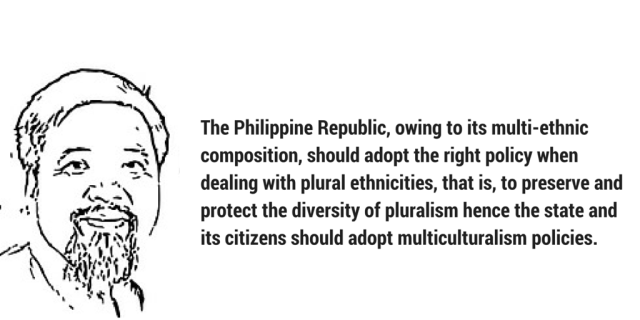‘E Pluribus’ and the Case of the Philippines
- Details
- Blog Content
- Hits: 5801

Fr. Eliseo 'Jun' Mercado is senior policy adviser with the Institute for Autonomy and Governance and chair of Kusog Mindanaw, a Mindanao-wide forum that brings together political, business, religious and social leaders towards a consensus in policy and action on relevant issues for Mindanao peace and development. Follow him on Twitter @junmeromi.
When we think of national unity, we need to locate the issue in the midst of our complex pluralism. The past slogan, “Isang Bansa at Isang Lahi” may no longer hold true vis-a-vis people’s struggle to assert their ethnic identity. Diversities in ethnicities need NOT necessarily work against national unity. Indonesia, our immediate neighbor and the US – our immediate Colonial master, have evolved a national unity amidst plurality thus the slogans: ‘e pluribus unum’ and ‘ Benaika tunggal maisa’.
Up front, we need to state that the Philippines is NOT a mono-ethnic state. The Philippines is composed of about 182 distinct ethnic groups with the Bangsamoro claiming 13 ethnic groups.
With this pluralism, the Philippine Republic with a multi-ethnic composition should adopt the right policy when dealing with plural ethnicities, that is, to preserve and protect the diversity of pluralism hence the state and its citizens should adopt multiculturalism policies.
There are, however, inherent dangers in such multi cultural ethnicities in a single nation state. This danger has been there thousands of years ago and we should have lessons how manage inter-ethnic relations. The caution should always be there and these diversities should NOT lead to communal conflict and violence.
It is rather easy to conclude that ethnicities including conflict and violence result to poverty and underdevelopment. Yes, it is easy to miss the insidious effects of poverty, rising inequality, limited growth, demographic pressure, weak political institutions, low state capacity, poor governance, unfavorable geography, natural resource dependence, environmental degradation, and of course foreign meddling among the many factors that may contribute to the outbreak of ethnic conflict.
Definitely, there is a myopic lens that dominates the present debates on the issue of Bangsamoro and the proposed Basic Law. While the Constitutional issues are being raised, this consideration hides fears and suspicions hence the lack of trust in the following areas:
1. The Fear and suspicion of secession;
2. The Fear of Discrimination of the new minorities in the Bangsamoro Autonomous Region;
3. The Suspicion on the capacity of the Bangsamoro to manage their affairs referring to the multi-ethnic groupings (13) within the Bangsamoro and the Non-Moro Indigenous peoples and the Christian inhabitants;
4. The lack of trust for the Baangsamoro to lead the economic development and utilization of resources within the said region; and
5. The consideration of the paramount issue of regional security vis-à-vis the avowed war against terror under the combined lead of US, EU, Japan and Australia.
I like the perception of the dilemma between plurality of system and proportional representation that the designers or architects of the new paradigm (Bangsamoro) failed to address adequately in the proposed Basic Law (the proposed BBL, House Bill 5811 and SB 2894) as well as in the 2014 CAB.
We need to identify the crucial challenges that face the Bangsamoro Autonomous Government. And these are the following:
■Adopt an electoral system that preserves and protects pluralism and proportional representation – a formula of real power sharing between and among the diverse plural ethnicities;
■Institutionalize a decentralized strategy that also promotes and protects ethnic plurality and their autonomy within the Bangsamoro Autonomous Region;
■Implement common social policies for ALL to promote unity amid diversities and finding a common bond and glue that would ensure social cohesion of the new political entity; and
■Address the causes of group-based inequalities in the Bangsamoro Autonomous Region.
No doubt, these four need thorough study and research that can be a sequel of the legislation of the Basic Law and the establishment of the Bangsamoro Government.

